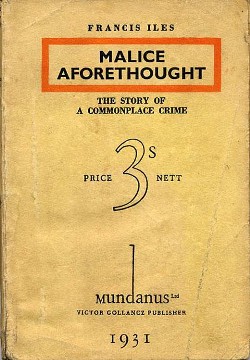This article needs additional citations for verification .(January 2021) |
 First edition | |
| Author | Anthony Berkeley writing as Francis Iles |
|---|---|
| Language | English |
| Genre | Crime novel |
| Publisher | Gollancz |
Publication date | 1931 |
| Publication place | England |
| Media type | Print (Hardcover and Paperback) |
| Followed by | Before the Fact |
Malice Aforethought (1931) is a crime novel written by Anthony Berkeley Cox, using the pen name Francis Iles. It is an early and prominent example of the "inverted detective story", claimed to have been invented by R. Austin Freeman some years earlier. The murderer's identity is revealed in the first line of the novel, which gives the reader insight into the workings of his mind as his plans progress. It also contains elements of black comedy, and of serious treatment of underlying tensions in a superficially respectable community. It is loosely based on the real-life case of Herbert Armstrong, with elements of Doctor Crippen.